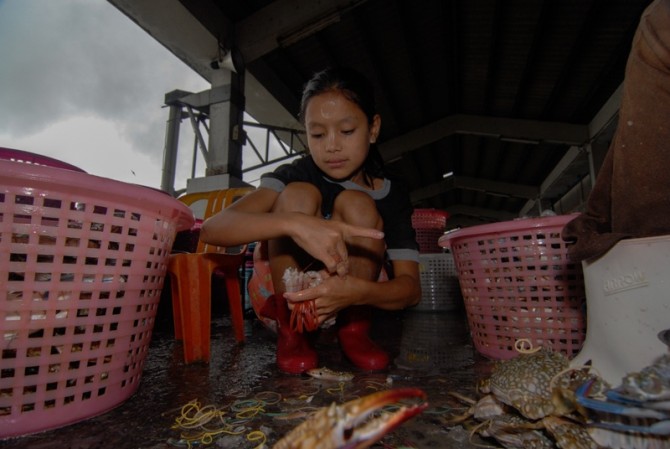Working conditions in Thailand’s fish factories have improved but problems persist in the treatment of migrant workers, according to a 1 June report released by Finland-based social responsibility NGO Finnwatch.
The paper follows up on previous research reports evaluating Thai tuna-packing factories’ working conditions, in particular for migrant workers.
This most recent study reported several improvements in the factories, including an increase in workplace safety and social security. It was not found that migrants’ passports were being confiscated – as has previously been reported in the industry – and all workers had reportedly been given written employment contracts.
However, the NGO found continuing problems in the treatment of the factories’ migrant workers. The report states that migrant workers, predominately from Burma and Cambodia, still face discrimination in the workplace and are forced to pay high recruitment fees.
Sonja Vartiala, executive director at Finnwatch, said that migrant workers find it difficult to make their voices heard.
“The complaint mechanisms and workers’ committees at the factories are not functioning as they should. Workers still cannot negotiate working conditions with their employer,” Vartiala told DVB on Wednesday.
According to the report, migrant workers are shown significantly less tolerance for mistakes and tardiness in the factory than their Thai colleagues, and have told of incidents where Burmese employees were fired for mistakes which would only earn a Thai worker a warning. Some migrant workers also said they had been verbally berated and slapped by their supervisors.
The study identifies high recruitment fees charged to Burmese workers which range from 150,000 to 250,000 kyat (US$150-$250), depending on where the person comes from. Finnwatch deemed these fees a “significant shortcoming” in the factories’ attempts to better the treatments of migrant workers, and called for a ban on their collection.
“The leading tuna factories and the tuna industry in Thailand must ban the collection of recruitment fees from migrant workers,” said Vartiala.
She added that the issue is not just confined to Thai borders, pointing to Western supermarkets and consumers as key players in the ethical consumption process.
“There’s a need for genuine dialogue between different parties and a change of purchasing practices of the European companies. Supermarkets should stop searching for the cheapest possible products and pay a lot more attention to working conditions in their supply chains.”
[related]
The Thai fishing industry has faced heavy criticism from the international community for failing to address numerous reports of forced labour likened to ‘modern day slavery’. Claims of Burmese and Cambodian migrants trafficked or otherwise lured into poorly or unpaid work have been emerging since 2011 when an anti-human trafficking division of the Royal Thai Police was established, and continue to be reported today.
In April 2015, the UK-based responsible development NGO Environmental Justice Foundation (EJF) released a research report, ‘Slavery At Sea’, which revealed ongoing cases of trafficking and forced labour, and pointed to Thai authorities as complicit in the crimes.
Detailed in the EJF’s paper were testimonies from Burmese migrants who had been conned into the Thai fishing industry by employment brokers where they are forced to work for little or no pay, suffering threats, beatings and starvation if they do not comply with their employer’s demands.
“The guys who brought us here were experts … We starved on the way but then they took us by police car and we were transferred to the pier. There we were sold,” reads the testimony of a 21-year-old Burmese migrant who set off by foot with 36 others from Myawaddy in Burma’s Karen State.
Following these reports, earlier this year the European Union (EU) threatened to ban fish and seafood imports from Thailand, unless the country ceased its illegal fishing practices and clamped down on trafficking and forced labour. As a result, concerted efforts have been made by Thai authorities to clamp down on such activities.
It is estimated that Thailand’s fishing industry accounts for 40 percent of the nation’s food exports, with 90 percent of the products sent to the US, EU and Japan. Migrant workers from neighbouring countries Burma and Cambodia are reported to comprise up to 80 percent of the workforce in the industry.



